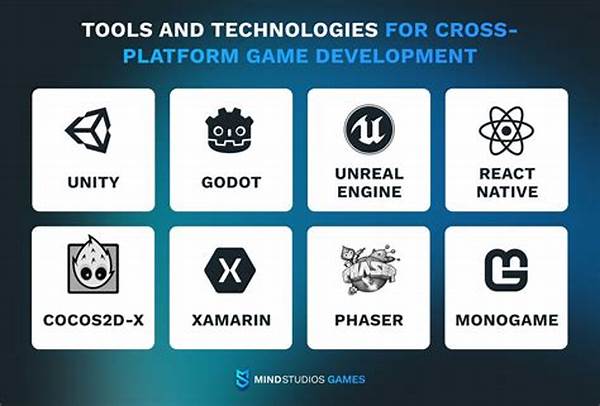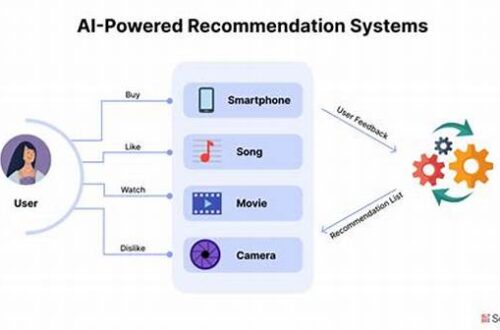Hey there, fellow game enthusiast! So, you’re diving into the thrilling world of game development and you’re probably wondering about the best ways to make your game accessible across different platforms, right? Enter the realm of cross-platform game development tools – the magical solutions that allow you to create games that work on multiple devices, from PCs to mobile phones, and even consoles. Let’s embark on this journey together and explore the fascinating tools that can turn your game development dreams into reality.
Read Now : Underwater Digital Mapping Tools
Why Cross-Platform Game Development?
First off, let’s talk about why cross-platform game development tools are the bee’s knees for developers. These nifty tools are designed to help you craft games that aren’t stuck on just one type of device. Imagine creating a game that can be played on a smartphone while you’re waiting for your coffee and then continuing the same game on your massive gaming rig at home – sounds sweet, right? That’s the power of cross-platform tools! They don’t just save you time and effort, they also open up your audience to anyone, anywhere, on any device.
Here’s how it works: instead of writing different codes for Windows, iOS, Android, and whatnot, you focus on a single codebase. This makes development a whole lot faster and more efficient. Think of it as a one-size-fits-all magic bullet for game dev – you write once, and then deploy everywhere. Plus, who doesn’t love reaching a wider audience with less hassle, right? The world is your oyster when you embrace the marvel of these development tools.
Above all, cross-platform game development tools are a godsend for indie developers or small teams. They cut down the costs, time, and resources required, making the whole process more streamlined and manageable. So, grabbing one of these tools might just be the smartest decision for getting the most out of your game. Stick around, because next, we’re going to delve into some of the best tools out there!
Top Cross-Platform Game Development Tools
Let’s dive into some of the top cross-platform game development tools that could become your new best friends in the game-making world. Unity and Unreal Engine are household names for a reason. They offer robust and comprehensive features. Want to avoid heavy code writing? Try GameSalad or Construct. Each has unique strengths in cross-platform game development.
Godot Engine is another worthy mention. Open-source and community-driven, it’s a great fit for budget-savvy developers. For those who love scripting, Corona SDK uses the user-friendly Lua language, making it ideal for quicker projects. Some tools, like Cocos2d, cater to those who want a simpler 2D approach. These cross-platform game development tools provide options galore!
In a nutshell, choosing the right tool depends on your specific needs, skills, and the complexity of your game. Happy exploring!
Pros and Cons of Cross-Platform Development
Like any tool, cross-platform game development tools have their ups and downs. On the plus side, you’ll enjoy a streamlined development process and reach broader audiences. It cuts the time and effort needed for separate platform coding. Plus, it’s kind of thrilling to see your game work seamlessly on multiple devices.
However, it’s not all sunshine and rainbows. There can be performance issues since the tool tries to fit your game into various systems. This sometimes results in pesky bugs or glitches. Smaller developers or teams might struggle with these challenges if the issues require more resources or expertise to fix.
Despite the cons, many argue the pros outweigh them. If you can navigate the occasional hiccup, the efficiency and reach of cross-platform game development tools make them worthwhile. With the right tool and mindset, you’re likely to find it a rewarding experience. Now, let’s wrap things up!
Tips for Choosing the Right Tool
Selecting the right cross-platform game development tools can be tricky. First, consider your experience level. Some tools are beginner-friendly, while others demand a bit more know-how. Next, think about your game type. 2D or 3D? Different tools have different strengths. Cost is another factor. Some tools are free, some have fees.
Check out the community and support available for each tool. It’s comforting to know there’s help when you’re stuck! Also, consider the platforms your audience uses. No point deploying on platforms your audience doesn’t frequent. Finally, test a few. Sometimes, hands-on experience reveals the best fit for you.
Choosing wisely ensures a smoother development process and maybe even some fun along the way!
Read Now : Step-by-step Puzzle Crafting
Best Practices for Using Cross-Platform Tools
Alright, let’s talk best practices for using cross-platform game development tools. First, optimize! Cross-platform games can get sluggish, so keep performance in mind from the start. Don’t forget to test your game on every platform you plan to release on. Little surprises pop up on different devices. Stay organized – one codebase but many targets can get messy real quick.
Collaborate! Whether you’re a solo developer or part of a team, leverage online communities and learn from others’ experiences. This can save time and headaches. Additionally, use version control systems to track changes and manage updates. Incremental testing and development can help catch issues early before they snowball into bigger problems.
Above all, remember to have fun and enjoy the process. This is game development after all – creativity and innovation at its finest!
Final Thoughts on Cross-Platform Game Development
Let’s wrap this up, shall we? Jumping into game development is an exciting journey, especially with cross-platform game development tools by your side. They offer the tantalizing promise of reaching a wider audience with less hassle – a real lifesaver for indie developers and smaller teams. Navigating the different options and potential hiccups can be challenging, but that’s part of the adventure, right?
Even with their quirks, the benefits of these tools are hard to ignore. They save time, reduce complexity, and allow developers to focus more on creativity. Sure, there are bumps along the way, like potential performance issues, but with patience and the right approach, they’re manageable. The game development community is vibrant and full of supportive folks who are more than willing to share their insights and lend a helping hand.
So gear up, pick the right cross-platform game development tools for your project, and dive into creating something amazing. The world deserves your vision, and cross-platform tools can help you bring it to life with ease. Can’t wait to see the awesome games you create! Happy developing!
Summary of Cross-Platform Game Development Tools
So, there you have it – a deep dive into the world of cross-platform game development tools. These tools are game-changers, pun intended, for anyone looking to create versatile games without being bogged down by different platform requirements. From Unity’s expansive reach to GameSalad’s user-friendly interface, there’s something out there for everyone, whether you’re a pro or a beginner.
The real allure of cross-platform game development tools lies in their ability to streamline the development process and enhance creativity. They cut down on redundant effort and allow you to focus on the more important aspects of game development, like storytelling and gameplay mechanics. And let’s not forget about reaching a bigger audience, which is every developer’s dream, right?
Sure, like anything, these tools come with a few hiccups, like performance issues or a learning curve, but with the right mindset and a bit of perseverance, these can be navigated. Plus, the community around game development is pretty awesome and supportive. So go ahead, give these tools a shot, and bring your game ideas to life across platforms. The gaming world eagerly awaits your creative touch!





